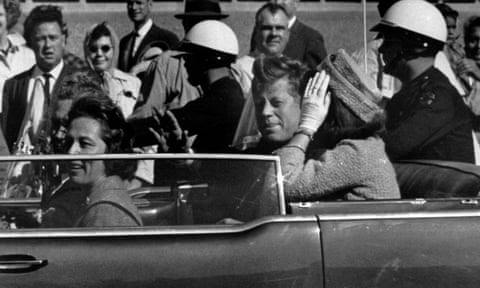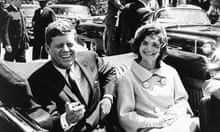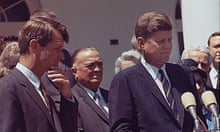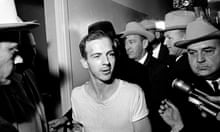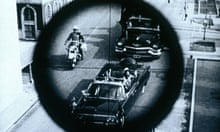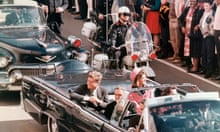“What happened in the window is not true,” said Ron Washington, holding a magazine containing grisly autopsy photographs of the 35th president of the United States. “It was only a decoy. Here’s the evidence.”
John F Kennedy was killed on 22 November 1963, about 15m (50ft) from where we were standing on Friday, underneath the sixth-floor window from which Lee Harvey Oswald fired – or didn’t, depending on your point of view.
Washington has been on the case for 27 years and comes to Dealey Plaza in downtown Dallas to sell conspiracy theory literature to tourists outside the former Texas School Book Depository, which is now a JFK museum.
“I believe in the truth and evidence shows, indicates, Oswald’s innocent,” he said, gesturing towards the nearby grassy knoll. “Try to understand that what happened in the window was only a decoy to draw the attention away from the gunman behind the fence.”
The imminent release of thousands of documents regarding the assassination is expected to shine at least a faint light on the government’s investigations, possible relationships with Oswald and his foreign trips, including a visit to Mexico City a few weeks before the shooting.
In 1992 – the year after Oliver Stone’s JFK prompted fresh interest in the roles of US intelligence agencies in the case – Congress ordered the files to be released from the National Archives no later than 25 years from the date of the law’s enactment. That deadline is Thursday.
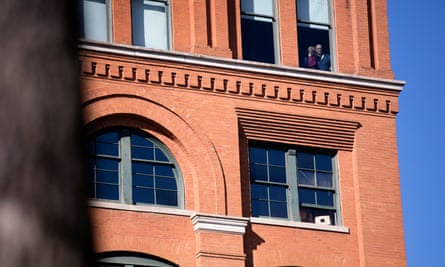
Thousands of documents were published online in July and historians and researchers eagerly await the final batch. Anyone anticipating a stunning revelation can, however, expect to be disappointed. More likely are insights and background information that might help build a fuller picture of the actions, methods and knowledge of key protagonists and agencies such as the FBI and CIA.
“We would like greater detail associated with things that are relevant to President Kennedy’s life and would help us understand who his adversaries may have been and for what reason he would have been viewed as an adversary to powerful elements within the national security establishment,” said Alan Dale, an administrator for several assassination websites.
“A lot of our focus for decades has been: who was Lee Oswald, what was he engaged in, what did he think he was engaged in, and is there any reason to be concerned that maybe the truth about his story has been hidden from all of us for all of these years?”
This is not a community with much faith in governmental transparency at the best of times, let alone in a government that, faced with a 25-year deadline, has procrastinated until the last moments over the release of information on events that occurred 54 years ago.
“They invite the scepticism of anyone that’s serious about the historical experience of the United States,” said Dan Hardway, a researcher for the 1977 US House select committee on assassinations, “which I think is much more serious than any wild conspiracy theories. There are very serious scholars, very serious researchers that have real questions and they are questions that should be answered and for which there should be answers in the records.
“By suppressing those things they invite continued scepticism which taints not just the JFK investigation but much of the attitude towards government. How is democracy anything but a joke if it’s being run by people who don’t even let us know what they’re doing?”
The wild card is the conspiracy theorist in the Oval Office. Donald Trump has the power to keep files secret for reasons of national security. His political career was energised by his fact-free assertion that Barack Obama was born in Kenya and so ineligible to be president. In May last year, he preposterously claimed that the father of a rival Republican, Ted Cruz, was seen with Oswald shortly before Kennedy’s death.
Trump tweeted on Saturday: “Subject to the receipt of further information, I will be allowing, as President, the long blocked and classified JFK FILES to be opened.” That left open the possibility that the CIA and FBI could ask for some to be withheld or redacted. The National Archives did not respond to a request for comment.
“Trump’s tweet seems noncommittal,” said Rex Bradford, president of the Mary Ferrell Foundation, which runs an extensive digital archive. “And it’s clear the CIA is lobbying him to withhold some files, including but not necessarily limited to CIA correspondence with the Assassination Records Review Board [created in 1992]. I think it’s past time they just release these in full.”
Certain tax records are among the documents unlikely to see daylight, Bradford said, adding: “I’m also concerned about what might fall through the cracks among the voluminous set of currently redacted documents, including important reports related to CIA surveillance of Oswald in Mexico City – these might shed further light on what many believe to be phony planted evidence implicating Castro.”
‘There is no other gunman’
Hugh Aynesworth, a Dallas Morning News reporter at the time, was the only person to witness Kennedy’s assassination, Oswald’s arrest and his murder by Jack Ruby. He has devoted much of his life to investigating the events, becoming a leading authority.
Over a plate of nachos at a Mexican restaurant a couple of miles north of the plaza, the 86-year-old sighed when asked about the ongoing appeal of theories at the more lurid end of the spectrum.
“There is no other gunman,” he said. “I guarantee it. Who in the world would like to expose, quote, ‘the real story’ more than me? I’ve been involved since the minute it happened, every step of the way.”

This may be the final document dump but a sense of closure is too much to expect. Social media and the internet, Aynesworth said, have helped fuel wild ideas. He logs on to Facebook from time to time.
“I see some of the strangest things on there,” he said. “Things that I thought were solved in the 60s, coming around again with another generation. It’s more fun to believe in conspiracies.”
The truth behind official obfuscation, Aynesworth believes, is prosaic: “It’s that old game, save your ass. You make mistakes hoping nobody’ll notice, and if you can throw away a document or two to make sure, you do it. It’s horrible but that’s the way government agencies work in most countries, some more than here, some less. It’s in their makeup: cover up, deny.”
Back at the plaza, as cars passed over two green Xs taped on Elm Street that unofficially mark the spots where Kennedy was struck, Arthur Ramm, a 68-year-old visiting from Newcastle for a guitar show, listened to Washington’s spiel, examined the magazine and took out his wallet.
“I think there’s too much controversy regarding all the evidence and it seems to me [Oswald] might have been set up,” he said. “But it’s pros and cons, you really have to gather everything in perspective and then make a decision. But I think he may have just been set up.”
